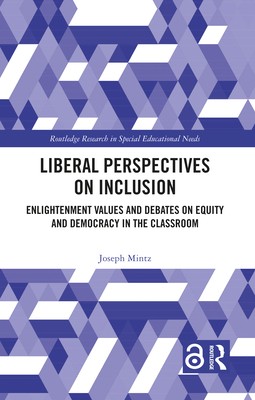
- Išsiųsime per 10–14 d.d.
- Autorius: Joseph Mintz
- Leidėjas: Routledge
- ISBN-10: 1032279966
- ISBN-13: 9781032279961
- Formatas: 15.6 x 23.4 x 1.1 cm, kieti viršeliai
- Kalba: Anglų
- Extra -15 % nuolaida šiai knygai su kodu: ENG15
Atsiliepimai
Aprašymas
Providing a theoretical underpinning for the idea of inclusion within education, this book recognises the fundamental role political values play in our understanding of inclusion in the classroom, providing a philosophical lens on the inherent tensions that exist within sociological perspectives on social justice, equity and diversity.
Chapters address value tensions from the perspective of classical liberalism and the extent to which this can be reconciled with values pluralism and Berlin's notions of negative and positive liberty. The book argues for a re-framing of inclusion as a process of negotiation between teachers, parents, children and young people which involves a recognition of the complex trade-offs involved in working with difference in the classroom. These tensions are explored through a series of case studies of real-world dilemmas in the classroom, ultimately serving to highlight the ways in which varying political value positions, including liberalism, are inescapably embedded within the practice in education.
Considering topics such as decolonisation of the curriculum freedom of speech and social justice, this seminal volume will be highly relevant for researchers, scholars and postgraduate students in the fields of inclusive education, special educational needs, philosophy of education, social justice and education and critical theory.
EXTRA 15 % nuolaida su kodu: ENG15
Akcija baigiasi už 4d.03:29:05
Nuolaidos kodas galioja perkant nuo 10 €. Nuolaidos nesumuojamos.

- Autorius: Joseph Mintz
- Leidėjas: Routledge
- ISBN-10: 1032279966
- ISBN-13: 9781032279961
- Formatas: 15.6 x 23.4 x 1.1 cm, kieti viršeliai
- Kalba: Anglų
Providing a theoretical underpinning for the idea of inclusion within education, this book recognises the fundamental role political values play in our understanding of inclusion in the classroom, providing a philosophical lens on the inherent tensions that exist within sociological perspectives on social justice, equity and diversity.
Chapters address value tensions from the perspective of classical liberalism and the extent to which this can be reconciled with values pluralism and Berlin's notions of negative and positive liberty. The book argues for a re-framing of inclusion as a process of negotiation between teachers, parents, children and young people which involves a recognition of the complex trade-offs involved in working with difference in the classroom. These tensions are explored through a series of case studies of real-world dilemmas in the classroom, ultimately serving to highlight the ways in which varying political value positions, including liberalism, are inescapably embedded within the practice in education.
Considering topics such as decolonisation of the curriculum freedom of speech and social justice, this seminal volume will be highly relevant for researchers, scholars and postgraduate students in the fields of inclusive education, special educational needs, philosophy of education, social justice and education and critical theory.




Atsiliepimai